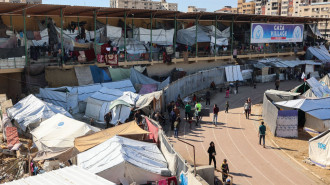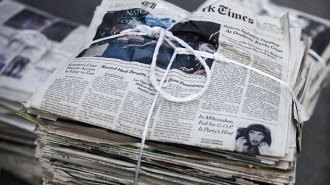With air bridge and diplomatic mobilisation, Iraq emerges as top Arab backer of Lebanon amid Israel offensive
In response to Israel’s ongoing war on Lebanon, Iraq’s Prime Minister Mohammed Shia' Al-Sudani has announced a comprehensive set of measures to support Lebanese citizens affected by the ongoing Israeli offensive.
The package of assistance comes as Israel’s military campaign continues to devastate Lebanon, particularly its southern and eastern regions.
Prime Minister Al-Sudani’s initiatives also include a 30-day renewable visa extension for Lebanese nationals already residing in Iraq, a waiver of penalties for those who have overstayed their visas, and the provision of free entry visas for new Lebanese arrivals at Iraq’s borders.
On Monday, Iraq’s Prime Minister issued a statement expressing the country’s solidarity with Lebanon in light of the ongoing developments, declaring that Iraq, both its government and people, stands for justice and principles.
“In the name of Iraq, both its government and people, we announce our commitment to organising efforts and delivering aid....We will make every effort to alleviate the suffering of our brothers in Lebanon, including establishing an air and land bridge to transport aid, and facilitating the delivery of fuel to power stations essential for hospitals and vital Lebanese services. Additionally, we are opening our doors to receive the wounded and injured in Iraqi hospitals, and will do everything in our power to support Lebanon’s resilience in the face of the terrorist crimes perpetrated by the Zionist regime," he said in a statement.
Iraq’s highest religious authority, represented by the office of Grand Ayatollah Ali al-Sistani, issued a strong statement of solidarity with the Lebanese people on Monday. The statement condemned the "brutal Zionist aggression" and called for urgent international intervention to stop the violence.
"In these difficult days that the noble Lebanese people are going through, as they are increasingly subjected to brutal Zionist aggression, the highest religious authority expresses its solidarity with its dear Lebanese," the statement from Ayatollah al-Sistani’s office read. It called for humanitarian assistance and global efforts to protect civilians and restore regional peace.
In Baghdad, the Iraqi Martyrs Foundation has launched a campaign to gather food and essential relief supplies for Lebanon. Abdul Ilah Al-Naeli, the head of the foundation, said the campaign was initiated in response to a direct appeal from Ayatollah al-Sistani. Donations are being collected at the foundation’s headquarters in Baghdad and in offices throughout Iraq's provinces. The campaign encourages contributions from employees, families of martyrs, and the general public.
Parliament schedules special session to address Israeli offensive
Iraq’s Parliament, meanwhile, has scheduled a special session for Saturday to discuss the Israeli attacks on Lebanon. The session will focus on denouncing the Israeli offensive and exploring further steps Iraq might take to aid Lebanon. According to a statement from the Parliament’s media office, the session aims to express Iraq’s official stance against what it termed the "heinous aggression" by Israeli forces.
Shia cleric Muqtada al-Sadr, a prominent figure in Iraqi politics, urged his followers on Tuesday to support the Lebanese people. In a post on the X platform, al-Sadr called on those organising services for pilgrims en route to Karbala to open their camps to displaced Lebanese citizens.
"This is the least we can do to honour the martyrs and the fighters," he said. Al-Sadr also appealed to wealthy Iraqis, particularly those uninvolved in corruption, to collect financial donations to establish refugee camps in Lebanon and Syria. He stressed that all funds should be delivered exclusively to the "Bunyan al-Marsous" headquarters in Najaf, with official receipts provided for transparency.
The human toll of the Israeli offensive is mounting. Israel’s airstrike on Sunday targeted southern Beirut, killing several family members of Nevin Samouri, a correspondent for Iraq's state-run Al-Iraqiya TV. The attack, which struck civilian areas, has intensified the region's already dire humanitarian situation.
According to Lebanon’s Health Minister Firass Abiad, Israel’s strikes have killed 569 people, including 50 children, and wounded 1,835 as of Monday. Thousands of displaced people are seeking refuge in schools and other buildings.
Diplomatically, Iraq is working to rally broader regional and international support for Lebanon. Prime Minister Al-Sudani met with Jordan’s King Abdullah II in New York, on the sidelines of the 79th session of the United Nations General Assembly.
The two leaders discussed the coordination of air and land bridges to facilitate the delivery of aid to Lebanon.
The meeting also covered the broader geopolitical impact of the conflict, including the destruction of infrastructure and hospitals in Lebanon and the worsening humanitarian crisis.
Al-Sudani reiterated the importance of convening an emergency Arab and Islamic summit, a proposal Iraq has pushed for, to address the escalating conflict and prevent further destabilisation in the region. He voiced support for Jordan’s ongoing efforts to engage with the European Union and other international actors to press for a ceasefire and to prevent what he described as "the ongoing genocide" against the Palestinian people.
On Wednesday, Egypt, Jordan, and Iraq accused Israel of driving the region towards a full-scale war following Tel Aviv's deadly airstrikes on Lebanon.
The foreign ministers of the three Arab nations convened on the sidelines of the 79th session of the UN General Assembly in New York.
In a joint statement, the countries emphasised that the path to stopping the "dangerous escalation underway in the region" begins with halting Israel’s actions in Gaza.
They cautioned that "Israel is steering the entire region towards an all-out war" and urged the international community and the UN Security Council to "fulfill their responsibilities to end the conflict."




 Follow the Middle East's top stories in English at The New Arab on Google News
Follow the Middle East's top stories in English at The New Arab on Google News
![People gathered around the rubble of destroyed houses to search for survivors [Getty]](/sites/default/files/styles/image_330x185/public/2024-11/GettyImages-2184733820.jpg?h=199d8c1f&itok=NiM1LO2f)

